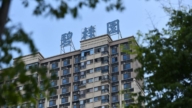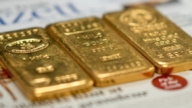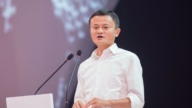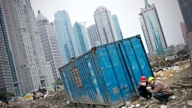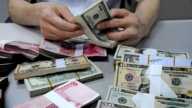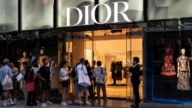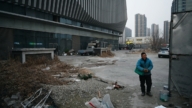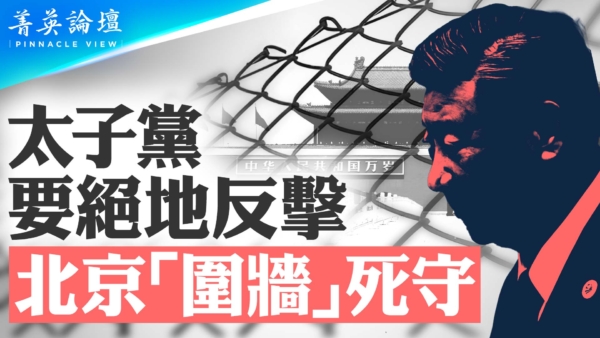【新唐人2014年01月03日讯】中国大陆2013年最后一天股市收盘,沪指报收2,115.98点,比前一年下跌6.75%。上证指数不仅与美股三大指数、及欧洲三大股指的强劲上走形成鲜明对比,在亚洲市场排名中也排名最后。2014年的第一天,中共财政部副部长感叹,中国经济难以为继。
在2013年最后一天,美国股市再创新高,全年涨幅创下16年来最高。美国道琼斯工业平均指数,以及标准普尔500指数,都超过金融危机之前的最高峰值,创下了新记录。 道琼斯指数全年上涨26.5%,为自1995年以来最大涨幅﹔标普500指数全年上涨29.6%,为自1997年来最佳表现,纳斯达克指数全年上涨38%,为自2009年以来最大涨幅。
欧州股指2013年累计上涨17.3%,创4年最大涨幅。31号收盘时,泛欧斯托克600指数上涨0.3%,收报328,创5年半新高。
在亚洲股指中,除泰国和印度尼西亚股指,年度下降分别为6.7%和0.98%外,其他所有国家在2013年都有所上升,其中日本涨幅第一,日经225指数,在一年内上涨了56.7 %,形成1972年以来最高年度增幅。
而中国股市不但没涨,表现甚至比连续街头抗议造成首都陷于混乱的泰国还差。截至12月31号收盘,沪指报2,115.98点,全年跌幅6.75%,连续4年全球垫底。今年最低点曾经跌到1,849点,超过万亿元的市值蒸发,直接造成财富缩水。
去年1月4号,中共官媒发表文章预言,2013年上证综指上限为3,600点,并且有望突破4,000点。不过结果却恰好相反。
大陆民间经济学者 邓先生:“股市是国家经济的风向标,它更多是有趋势性的,它已经从实体经济的寒冬已经来临感受到了,那对股市而言就是深冬,现在是隆冬了,最起码对目前而言,我认为是一个阶段性的警惕。”
近几年,海外经济学家一直在谈论,中国的经济在硬着陆。中共新政上任后也意识到中国经济的危险程度,从而“壮士断腕”,“深化改革”,“全面改革”等说法此起彼伏。
2014年第一天,中共机关刊物《求是》杂志,刊登中共财政部副部长王保安的文章指出,长期以来,中国经济增长呈现典型的“四高四低”特征,也就是“高投入、高消耗、高污染、高速度”,与“低产出、低效率、低效益、低科技含量”。王保安也承认,中国经济的现行版难以为继。
邓先生:“我们不是着陆了,我们已经掉到沟里了,去看看实体经济,各行各业的问题,民营企业家是最有发言权的,前一段时间的资本外流,不是证明了一个很危险的信号吗?”
王保安说,中国单位国内生产总值(GDP) 能耗,是世界平均水平的2.6倍。中国每个就业者创造的GDP仅为美国的21%、日本的32%。多年来,中国工业增加值率基本在26%到30%,而发达国家一般为35%左右,美国、德国等超过40%。
据测算,中国GDP每增长1美元,大约需要5美元的投资,资金投入成本比日本和南韩经济起飞时期要高40%之多。中国的投资率已接近50%,有的省份甚至达到80%。
大陆金融分析师任中道:“中共的制度导致了中国是靠政府投资去拉动GDP的增长,但是现在投资也玩不转了,投入一块钱只有几毛钱的价值产出,所以它拉动不了经济的增长。”
中共审计署最新报告显示,截至2012年底,有3个省级、99个市级、195个县级、3,465个乡镇政府,负有偿还责任债务的债务率高于100%。
王保安认为,中国经济的出路,关键就是打造中国改革的升级版,以制度创新为突破口,推动科技创新。
任中道:“都是为了保自己的政权,保那个党,产生的一种妥协,一种改变,它不是为民生的福祉,为国家的经济的好转去积极的努力。”
经济学家指出, 美联储退出货币量化宽松后,大量的热钱将会流回美国,中国的经济将会雪上加霜。
采访编辑/刘惠 后制/周天
China’s Stock Market Lowest in the World – Unsustainable Economy
On the last day of 2013, China’s stock market closed with the
Shanghai Index at 2,115.98 points – down 6.75 percent from 2012.
This is a big contrast to the three major U.S. stock indices
and the European stock indices that are climbing up.
It is also the lowest one in the Asian market.
On January 1 2014, Deputy Minister of the
Ministry of Finance of the Chinese Communist Party (CCP)
lamented that China’s economy is unsustainable.
On the last day of 2013 the U.S. stock market set a new record,
with annual increase hitting a 16 year high.
U.S. Dow Jones Industrial Average and the S&P 500 index
both passed the peak before the financial crisis,
setting new records.
Upon closing on December 31,
the Dow Jones index rose 26.5 percent year-round,
the biggest gain since 1995;
Standard & Poor’s 500 index rose 29.6 percent year-round,
for the best performance since 1997,
the Nasdaq composite index rose 38 percent year-round,
since 2009 self the largest increase.
European stock indices rose 17.3 percent in 2013,
the highest in the past four years.
Upon closing on December 31, the pan-os Trafigura 600 index
rose 0.3 percent to 328, a five and a half year high.
All Asian stock indices grew in 2013
except Thailand and Indonesia with an annual decline of
6.7 percent and 0.98 percent.
Japan’s stock market rose the highest
with the Nikkei climbing 56.7 percent to at 225,
the highest annual growth rate since in 1972.
The Chinese stock market not only did not rise,
it dropped even further than Thailand, a county with
continuous street protests and chaos in the capital city.
As of December 31 the Shanghai index reported 2,115.98 points,
an annual decline of 6.75 percent,
and the fourth consecutive year at the bottom of the global market.
The lowest point in 2013 hit 1,849 points,
over one trillion yuan in market value evaporated.
directly leading to deterioration of wealth.
On January 4 2013, CCP official media published an article
predicting that in 2013 the Shanghai Composite Index
is capped at 3,600 points and is expected to exceed 4,000 points.
But the result was just the opposite.
Chinese civil economist Mr. Deng:
“The stock market is the country’s economic benchmark.
It is more like a trend. It has already felt the coming winter.
Now is the cold winter. At least for now it is a phased alert."
In recent years, overseas economists have been talking about
the hard landing of the Chinese economy.
The CCP’s new leadership also realized the extent of the danger
after they took power.
Discussions around deepening and comprehensive reform
are rumored.
On January 2014, CCP party journal Seeking Truth published
CCP Ministry of Finance Deputy Minister Wang Baoan’s article.
For a long period of time, China’s economic growth
showed the typical “Four-High and Four Low" feature:
“High Input, High Consumption, High Pollution and High Speed"
and “Low Output, Low Efficiency, Low Return and Low-tech."
Wang Baoan acknowledged that China’s
current economy is unsustainable.
Mr. Deng: “We did not land.
We dropped into the ditch.
Go around and see the real economy,
and the problems in all walks of life.
Private entrepreneurs are most qualified to speak.
Didn’t the capital outflows some time ago
prove a very dangerous signal?"
Wang Baoan said China’s GDP energy consumption unit
is 2.6 times the world average.
China’s GDP created per employee is only
21% of the U.S. and 32% of Japan.
Over the years China’s industrial added value rate is
between 26% to 30%, while in developed countries it is generally
about 35%, with U.S. and Germany surpassing 40%.
It is estimated each US $1 growth of China’s GDP
needs about $5 investment.
The capital investment costs 40% more than Japan and Korea
during their economic take-off.
China’s investment rate is close to 50%,
some provinces even up to 80%.
China’s Financial Analyst Ren Zhongdao: “The CCP regime
leads to the government investment model for GDP Increase.
The investment does not work now.
For each dollar invested, only dozens of cents are produced.
It cannot lift economic growth now."
The latest report of the CCP’s National Audit Office shows that
as of the end of 2012, 3 provincial, 99 city-level,
195 county-level and 3,465 township governments
bear the responsible for paying a debt ratio of over 100%.
Wang Baoan believes that the way out for the Chinese
economy is to build an upgraded version of reform –
breakthrough the system to promote
scientific and technological innovations.
Zhen Zhongdao: “All changes are done to protect
the regime and the party. There are not done proactively.
The compromises and changes are not for people’s well-being,
or for the country’s economic turnaround."
Economists indicate the U.S. Fed’s exit from quantitative easing
leads to a large amount of hot money flowing back to the U.S.
China’s economy will get worse.
Interview & Edit/LiuHui Post-Production/ZhouTian


